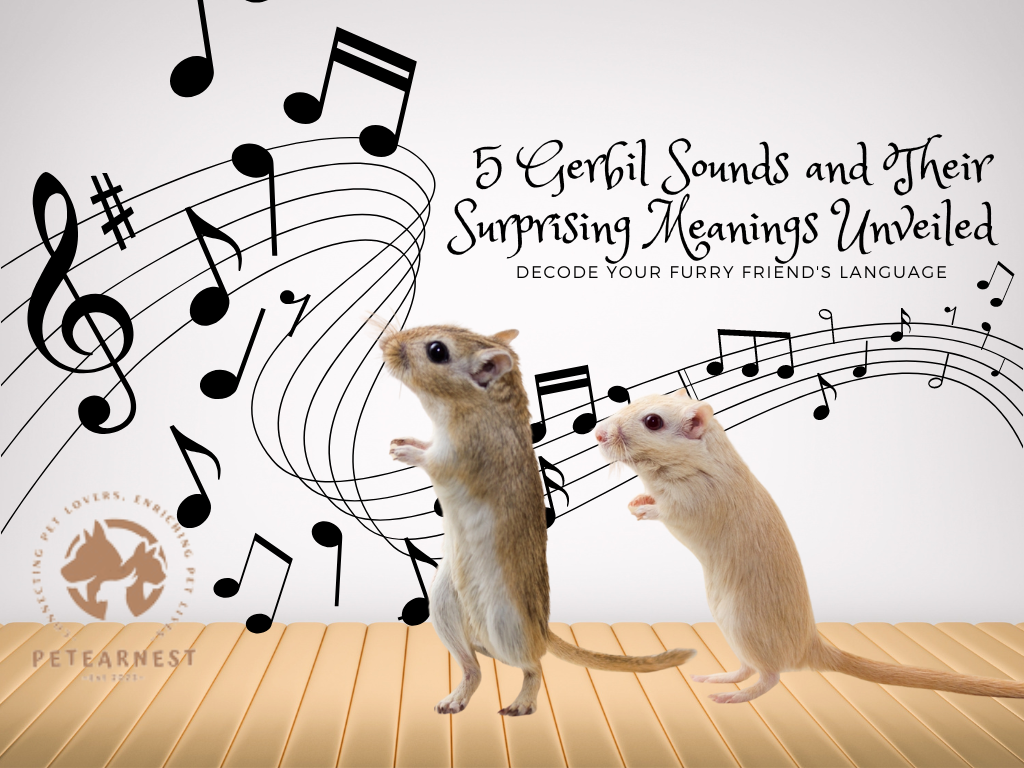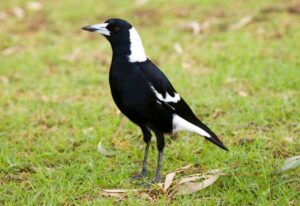Gerbils are adorable and playful pets that are known for their active and curious nature. These small rodents communicate with their owners and other gerbils through a variety of sounds, each with a specific meaning. Understanding what your gerbil is trying to communicate can help you better care for your furry friend and build a deeper bond with them.
In this article, we’ll be delving into the world of gerbil sounds and their surprising meanings. We’ll explore the most common noises gerbils make, including squeaks, chirps, and purrs, and decode what they could be telling you about their mood, health, and environment. Whether you’re a seasoned gerbil owner or just starting out, you’ll learn some fascinating insights into your pet’s unique language.
From the cheerful “wee-oo” sound of a content gerbil to the high-pitched “eek” that signals fear or distress, each gerbil sound has its own distinct tone and purpose. We’ll also explain how to distinguish between normal and abnormal gerbil sounds, so you can identify potential health issues early on.
By the end of this article, you’ll be a gerbil sound expert, with a newfound appreciation for the complexity and richness of your pet’s communication. So sit back, grab some treats for your gerbil, and get ready to unlock the secrets of their language.

Gerbil Sounds and Their Surprising Meanings Unveiled
1. Understanding the Meaning and Context of Gerbil Chirps
Chirping is the most common sound that gerbils make and is usually the first sound that owners become accustomed to hearing from their pets. This high-pitched sound is often associated with young gerbils trying to get their mother’s attention, but adult gerbils can also chirp to communicate with their owners.
The nature of chirping can vary depending on the context. For instance, playful chirping will sound different from the chirping made when fighting or when in distress. Similarly, a young gerbil chirping for its mother will not sound the same as an adult gerbil trying to get your attention.
When a gerbil chirps, it’s typically a sign that they want attention or are trying to communicate with their owner. This can mean a variety of things, such as wanting to play or share something they found while playing, or simply looking for some bonding time with their owner. In any case, chirping is generally a positive sign that your gerbil is in a good mood and trusts and likes you.
However, excessive chirping or chirping in an unusual tone or context could be a sign of stress or illness, so it’s essential to pay attention to your gerbil’s behavior and seek veterinary attention if needed.
In summary, chirping is a common and fascinating gerbil sound that can provide valuable insights into your pet’s mood and behavior. Whether your gerbil is chirping for attention or playtime, it’s a sign that they feel safe and happy in their environment, and that they trust and enjoy spending time with you.
2. Decoding Gerbil Squeaks: What Your Pet is Trying to Communicate
Gerbils are adorable and social animals that communicate through various sounds, one of which is squeaking. Squeaking is a high-pitched sound that can startle you if caught off guard, but it’s important to understand its meaning.
One squeak or a series of squeaks can mean different things, depending on the context. If you have more than one gerbil, it’s essential to understand their relationship, as squeaking can indicate whether they’re playing, fighting, in pain, or excited.
Fighting: The Most Common Reason for Gerbil Squeaks
When two male gerbils are in the same cage, it’s natural for them to establish a hierarchy. Play fighting is a typical behavior to test each other, and if they’re wrestling without biting, it’s probably play fighting. However, if the squeaking becomes louder and more frequent, it’s an indication that they’re fighting for real. As an owner, it’s crucial to keep an eye on them and intervene if necessary.
Pain: When Squeaking Indicates Your Gerbil is Hurt
If a gerbil is in pain, it will make a sharp squeak that indicates something is wrong. If you’re holding your pet and it makes this sound, you may have held it too tight, or it could be ill or injured. Urgency is the key here, as a high-pitched squeak means your gerbil needs help.
Talk Between Gerbils: Communication in Gerbil Communities
Like humans, gerbils also communicate with each other for no apparent reason. They could be enjoying their food while squeaking, or the adults could be addressing the younger ones. In the wild, this type of communication is crucial for gerbils to keep track of each other.
Excitement: Positive and Negative Squeaking in Gerbils
Finally, gerbils also squeak when they’re excited. It could be a positive or negative emotion, depending on the situation. For instance, if they see you after a couple of hours, they may squeak out of joy and start jumping up to reach you. However, if the squeak is loud and urgent, it indicates a frightening situation, such as an unknown person or pet entering the room.
In summary, understanding gerbil sounds, particularly squeaking, is vital to taking care of your pets. By paying attention to the context and urgency of the squeaks, you can help ensure your gerbils’ well-being and enjoyment.
3. Understanding Gerbil Sounds: The Happy Purring Noise
Gerbils are not just known for their high-pitched squeaks, but they also make happy noises to express their contentment. One of the most pleasant sounds that gerbils make is purring, which is a low rumbling noise that may go unnoticed at first. Unlike cats, gerbils do not use their voicebox to create this sound, instead, they tap and grind their teeth together. This produces a rumbly sound that can be described as teeth chattering, with slight movements visible around the jaw area. Additionally, the vibration created by the teeth tapping together is why this sound is called purring.
When a gerbil is purring, it is content and happy in its surroundings, especially when in the company of other gerbils or when being held and shown affection. Purring is a rare noise for gerbils, and not all gerbils purr. However, owners with gerbils that purr describe their pets as happy, content, and comfortable. If a gerbil doesn’t purr, it does not necessarily mean that it is unhappy. It could be that the gerbil has not learned to be affectionate with people, and therefore, it won’t enjoy stroking as other gerbils do.
In summary, if you hear your gerbil purring, it is a good indication that your pet is happy and content. Purring is a rare but positive sign that your gerbil is comfortable and enjoying its surroundings. Gerbils that purr tend to be friendly and affectionate, making them fun pets to have.
4. Understanding Gerbil Behavior: Why Do Gerbils Thump Their Hind Feet?
Gerbils are social animals that communicate with each other through various sounds and behaviors. One of the most distinctive sounds a gerbil can make is the loud thumping of its hind feet. But what does it mean when your gerbil starts thumping?
As it turns out, there are several reasons why a gerbil might thump its feet. Firstly, thumping can be a display of dominance, serving as a warning to other gerbils to stay away. The loud and low thumping can be particularly scary for smaller gerbils.
Secondly, thumping can also be a part of a mating ritual. Male gerbils may run around their enclosure while thumping their feet, as a display of dominance to attract a female mate.
Thirdly, gerbils may thump their feet as a defense mechanism against threats and predators. Research published in the European Journal of Pharmacology suggests that thumping can be an effective way for gerbils to scare away potential dangers. This is why gerbils may stomp if they feel threatened, or if they hear loud noises that could be perceived as a threat.
It’s important to note that gerbil thumping can be particularly scary for other pets, such as cats and dogs, who may not understand the cause of the noise. So, it’s essential to supervise interactions between pets and ensure their safety.
In summary, gerbil thumping can mean different things, depending on the context. It can be a display of dominance, a mating ritual, or a defense mechanism against threats and predators. Understanding your gerbil’s behavior and vocalizations can help you provide a comfortable and safe environment for your furry friend.
5. Understanding Gerbil Clicking: Respiratory Infection Symptoms
Unlike other gerbil noises, clicking is not related to your pet’s mood. It is a serious symptom of a respiratory infection that requires immediate veterinary attention.
Gerbil clicking occurs when your pet’s airways are blocked due to a respiratory infection, causing breathing difficulties. This rhythmic sound happens as your gerbil breathes in and out. Other signs of respiratory infection include runny nose and watery eyes, wheezing breath, lack of appetite, and a higher temperature than usual. Coughing and sneezing may also occur.
If you suspect your gerbil has a respiratory infection, it’s crucial to take them to a veterinarian as soon as possible. Delaying treatment can lead to further complications and potentially fatal consequences for your pet.
FAQs
- Why is my gerbil making a chirping noise?
- If your gerbil is making a chirping noise, it’s likely a sign of contentment or excitement. Gerbils will often make this noise when they’re playing or exploring their environment.
- How can I tell if my gerbil is thumping its feet out of fear or aggression?
- Gerbils will often thump their feet as a warning to other gerbils in a display of dominance. However, they may also thump their feet out of fear or as a response to a perceived threat. If your gerbil is thumping its feet, pay attention to its body language and other behaviors to determine whether it’s feeling fearful or aggressive.
- What should I do if my gerbil is making a clicking noise?
- If your gerbil is making a clicking noise, it’s likely a sign of a respiratory infection. This is a serious condition that requires urgent medical attention. Take your gerbil to the veterinarian as soon as possible for a proper diagnosis and treatment plan. Other signs of a respiratory infection include a runny nose and watery eyes, wheezing breath, lack of appetite, and coughing and sneezing.
Conclusion
In conclusion, gerbils communicate in a variety of ways, each with its unique meaning. Squeaking is a common noise that gerbils make when they’re in pain or feeling threatened, while chattering or purring indicates they’re happy or content. Thumping and drumming are more serious noises that may suggest a warning to other gerbils, a sign of interest in mating, or an attempt to scare away a threat. Clicking, on the other hand, is an urgent signal that your gerbil may be suffering from a respiratory infection and requires medical attention. Understanding the sounds that gerbils make can help pet owners identify and address their pets’ needs more effectively.
If you have any questions or comments about gerbil communication, please feel free to share them in the comment box below.

Killing of mom bear in Italy sparks outrage
The killing of a mom bear in Italy has ignited protests and criticism from animal rights teams and authorities

Hope for lonely elephant Madhubala to be relocated in Pakistan
Elephant Madhubala, credit score: 4 Paws The 19-year-old African elephant Madhubala has been dwelling alone at Karachi Zoo in

20,000 pigs killed after fireplace at pig manufacturing facility in Germany
A devastating fireplace at a big pig fattening manufacturing facility in Germany killed 20,000 pigs. The hearth began late Friday

One-year-old humpback whale dies from trauma in US waters
A younger male humpback whale has died on account of blunt pressure trauma, the Marine Mammal Stranding Heart (MMSC) mentioned.

Well-known magpie Molly and canine Peggy reunited
Molly, the magpie, and her canine companion Peggy reunited on Thursday, their in style Instagram account introduced. The 2 have

1000’s of monkeys used for testing transported by way of Iceland
Bluebird Nordic, an airline from Iceland, has been concerned within the controversial transport of 1000’s of monkeys. The long-tailed macaques


